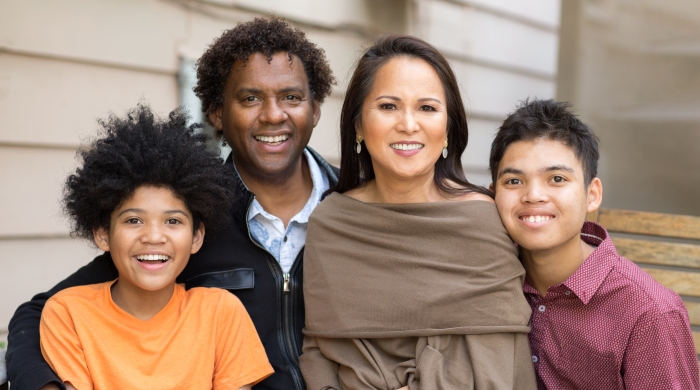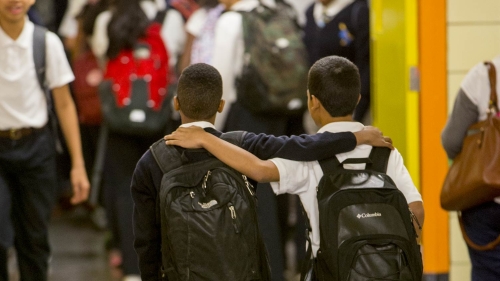NYU Steinhardt’s ASD Nest Support Project is celebrating 20 years of partnering with New York City’s Public Schools (NYCPS) to establish inclusive cultures and advance the development and implementation of educational practices for autistic learners through the implementation of the ASD Nest Support Project.
Before the advent of the ASD Nest program, parents of autistic children in New York City had two choices: a District 75 school for children with severe disabilities, where basic curriculum took a back seat to therapeutic services; or a neighborhood school where teachers didn’t understand how to teach autistic children and few opportunities existed to learn alongside their non-autistic peers. In either case, these children were not included in their community schools and generally had poor outcomes.
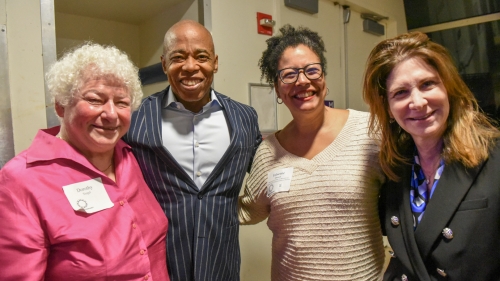
ASD Nest co-founder Dorothy Siegel, NYC Mayor Eric Adams, Steinhardt Metro Center Executive Director Fabienne Doucet, and NYU President Linda G. Mills.
In 2002, Carmen Guillén Fariña (BS ’65), the District 15 Superintendent at the time, appointed a study group to answer the question, “Why can’t children with autism who can do grade-level academic work be educated in their neighborhood schools?”
The fruit of this question and subsequent collaboration became the ASD Nest program. The pilot program ran at PS 32 in Brooklyn in September 2003 with the goal to help all children learn in an inclusive setting to develop academically, behaviorally, and socially in school and function well in their community.
Now, in the 2023–2024 school year, the ASD Nest program serves more than 2,065 autistic children alongside over 4,430 non-autistic peers in over 413 fully inclusive classrooms in 83 schools from kindergarten through grade 12 in New York City public schools.
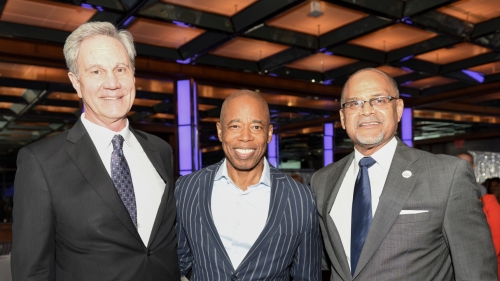
Gale and Ira Drukier Dean Jack H. Knott, NYC Mayor Eric Adams, and NYC Schools Chancellor David C. Banks.
“At its core, the ASD Nest Support Project is about true inclusion, creating a classroom in which everyone belongs,” says Allison Graham Brown, executive director of the program and herself a former ASD Nest teacher in the NYCPS. “This is an Integrated Co-Teaching (ICT) classroom designed to meet the needs of autistic learners and their neurotypical peers. The program helps create a safe space for learners of all kinds, celebrates all abilities, and builds a sense of community by helping kids stay in their neighborhood schools.”
The ASD Nest model is a fully inclusive, therapeutic environment designed for autistic students who can do grade-level academic work when provided the necessary support. This is a strengths-based model utilizing positive and proactive strategies, targeted instructional strategies, and specialized social interventions to make inclusion work well for all learners in the classroom.
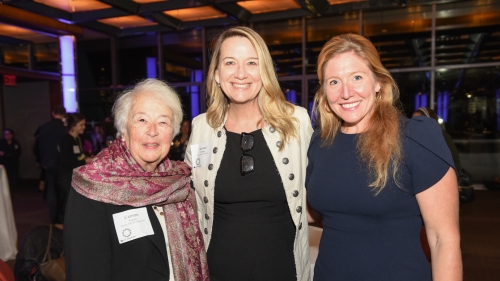
Former District 15 Superintendent Carmen Guillén Fariña, ASD Nest principal investigator Kristie Patten, and ASD Nest Executive Director Allison Graham Brown.
In the 2015–2016 school year, the ASD Nest Support Project provided training and coordination for the first ASD Nest model outside of New York City for the school system in Aarhus, Denmark, for their first two "Grade 0" classes in their school, Katrinebjergskolen.
“The ASD Nest program is not one-size-fits-all,” says Graham Brown. “The model is responsive so we can partner with each school and community to create environments in which all students can thrive.”
To celebrate 20 years of success for children throughout New York City and beyond, ASD Nest held a special anniversary event on November 6 at the Kimmel Center’s Rosenthal Pavilion. In his opening remarks, Gale and Ira Drukier Dean Jack H. Knott quoted the late disability rights activist Judith Heumann: “Change never happens at the pace we think it should. It happens over years of people joining together, strategizing, sharing, and pulling all the levers they possibly can.”
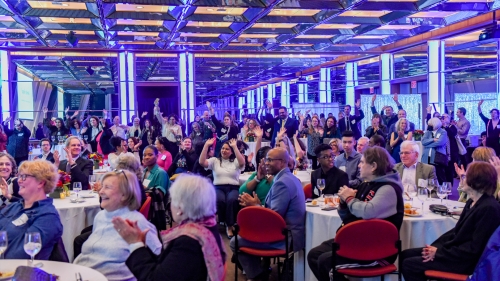
Around 200 guests attended the ASD Nest Support Project anniversary event.
“The [Nest] model remains at the forefront of the field and an exemplar of inclusive education across the country,” said Linda G. Mills, president of New York University, at the event.
Around 200 guests attended, including New York City Mayor Eric Adams, New York City Schools Chancellor David C. Banks, and ASD Nest co-founder Dorothy Siegel. Many NYU faculty and staff, NYCPS senior leadership, NYCPS principals and program partners, autism advocates, and graduates of the ASD Nest program and their families were also part of the event.
“Thank you to all the educators for creating this ‘nest’ – this safe space that does not ostracize young people because they learn differently,” said New York City Mayor Adams. “For far too long, we threw them out of the nest and made them feel as if they had no place in the nest – and now they do. These educators are saving the lives of their fellow New Yorkers.”
Related Articles
ASD Nest Support Team Embarks on the 2023-2024 Academic Year and Salutes 20 Years of the ASD Nest Program
Learn how the ASD Nest program has – and will – support Autistic learners in their communities.
ASD Nest Support Project at NYU Metro Center Assists with the Expansion of ASD Nest-inspired inclusion classes in Denmark
Scandinavian Educators travel to the U.S. to obtain urgent training from ASD Nest Support Project to expand secondary school options back home in Denmark.
NYU Metro Center’s ASD Nest Support Project fosters Pathways for Neurodivergent and Autistic NYC DOE Students to amplify their Voices
The ASD Nest Support Project at NYU Metro Center partners with a non-profit organization to empower children and teens to make their voices heard through collaborative songwriting.

